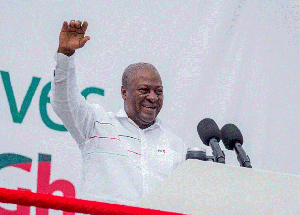The constitutional mandate of the Electoral Commission must be “respected” by all the political stakeholders, former President Jerry John Rawlings has said at the 41st-anniversary celebration of the June 4, 1979, uprising.
“Ladies and gentlemen, our democracy is borne out of fire and we must dearly and compassionately protect its flames. One of the key institutional arms of this democratic discourse from pre-colonial to modern-day Ghana is the protection of right and choice. We must endeavour, as a nation, to deepen the spirit of the consultative process, equity, respect for the rule of law or in simple terms, the tenet of democracy and multiparty democracy”, Mr Rawlings said told his virtual audience.
The EC, “which is the fulcrum of our multiparty democracy”, he noted, “must be supported and protected by all stakeholders; to ensure a free and fair election and a peaceful society”.
“That notwithstanding”, Mr Rawlings pointed out, “it is equally important for that revered institution, EC, to ensure that the processes leading to this year’s elections are done in consultation with the stakeholders of the nation; to prevent unnecessary suspicion, and promote a peaceful and cohesive society”.
“An election is an event but, building a democratic, free and peaceful society is a process so the debate surrounding the new voter’s register must be thoroughly examined so we do not undermine the successes we have chalked so far, as a nation”.
“In addition, the constitutional mandate of the Electoral Commission must be respected by all. While we work towards perfecting our electoral process, I urge you all to pursue and sustain our uniqueness as a country in the democratisation process”, he said.
According to the former president, “The sanctity of the right of choice is not a matter we can compromise with. That sanctity must be preserved at all cost and as we inch towards November let us ensure that the institutional processes are transparent and beyond blemish”.
“Freedom and justice is not abstract”, he observed, adding: “It is very much related to the sanctity of the right of choice. Those who are eligible to exercise that right of choice should not and cannot be disenfranchised by dictates that defeat one’s right to vote”.
“The sanctity of justice should be preserved and protected with all of us being subject to the practice of what is just. An unjust society deepens the inequities that exist”.
“The patriotic zeal that gave birth to June 4 is one that cannot be extinguished. Any attempt to compromise on the ideals of probity, accountability and integrity in our everyday lives is an attempt to snuff out the light that was lit 41 years ago. Let us honour the memories of those who laid down their lives liberating Ghana”, he said.
Meanwhile, Ghana’s Supreme Court, on Thursday, 4 June 2020, asked the EC to adduce reasons for its exclusion of the current voter card from its intended registration exercise for new voter cards.
The apex court gave the EC up to Monday, 8 June 2020 to provide the explanation.
The National Democratic Congress (NDC) sued the Electoral Commission over the matter.
The NDC argues in its suit that the EC lacks the power to go ahead with its plans because it can only “compile a register of voters only once, and thereafter revise it periodically, as may be determined by law”.
The seven-member bench comprised Chief Justice Kwasi Anin Yeboah and Justices Jones Dotse, Paul Baffoe Bonnie, Sulley Gbadegbe, Samuel Marfo Sau, Nene Amegatse, and Prof Ashie Kotey.
The NDC is represented in the matter by Mr Godwin Tameklo while the election management body is represented by Mr Justin Amenuvor. The Attorney General is represented by Deputy Attorney General Godfred Dame.
Last month, the NDC’s Director of Elections, Mr Elvis Afriyie Ankrah said up to 93 per cent of eligible voters in the Upper East and Upper West regions of Ghana will be disenfranchised should the EC go ahead and rely only on the Ghana card and passports as the primary documents for registering people for the issuance of new voter ID cards.
According to Mr Afriyie Ankrah, the quest by the EC to register 18 million eligible voters within 40 days as the coronavirus pandemic ravages on, is impractical.
The EC has laid a Constitutional Instrument before Parliament seeking to make passports and Ghana cards the only primary documents that any eligible voter can use for registration for the voter ID card.
Speaking at a press conference on Thursday, 21 May 2020, Mr Afriyie Ankrah, however, said: “Only about 6.5 million people have access to the NIA card”, so far, and, therefore, wondered how the remaining several millions of eligible voters can be registered for the new voter ID card when they have no Ghana card.
“The NIA could not dispute our claim that only 5.17 per cent and 6.36 per cent of the registrable population in the Upper West and Upper East regions, respectively, have been issued Ghana cards, as we speak.
“So, Upper West, Upper East, Northern, Savannah, North-East, you look at the figures, 86 per cent, 84 per cent, 85 per cent and Upper East and Upper West 5.17 per cent and Upper East 6.36 per cent. So, the rest of the ninety-something per cent, what is going to happen to them? Are they not Ghanaians? Do they not deserve to be treated rightly, fairly and justly as anybody else? Do they have to go through the hustle of trying to find people to guarantee for them with all its delays and frustrations?” he asked.
He said the EC’s reliance on the Ghana card for the registration, which, according to him starts next month, will sideline “over 93 per cent of eligible voters in these two regions, which are strongholds of the NDC”.
“So, take note of that because when we speak, they say where is the conspiracy. So, by strange, accidental reason, [in] the strongholds of the NDC, you have a situation where 93 per cent of eligible voters in these two regions would not have access to their cards.
“And they have to resort to the secondary method of vouching as the norm rather than the exception. Is it fair, is it right? Are you creating a level playing field?”
“The big question, therefore, is: why would the Jean Mensa-led EC rely on an identification card, Ghana card, whose issuance is largely incomplete, and fraught with several anomalies and demographic disparities? Why is the Jean Mensa-led EC excluding from the list of registration requirements under the proposed C.I., their own widely available and acceptable voter ID card and rather including the Ghana card, which is currently possessed by just about 6.5 million Ghanaians who are 18 years and above? A card which is currently not accepted by any public, private or commercial institution.
“You go to the banks today; they don’t accept Ghana cards. So, why would they insist, after telling the whole public that they are going to use the old card and then surreptitiously, they go and remove the card and then now insist on a Ghana card, which the majority of the citizens do not have?
“The commonsensical question that is begging for an answer is: why the Jean Mensa-led EC excluded the exiting voter ID card from the list of registration requirements provided under the proposed C.I. Why have they excluded an ID card that has been upheld by the Supreme Court, as the best prima facie of voter eligibility. This is a decided case by the Supreme Court; that is law. When a Supreme Court makes a proclamation, it is akin to law.
“So, is the EC above the law? Can they do whatever they want? And they’ll quote: ‘We’re an independent institution’. [An] independent institution must be within the confines of the law and reason and commonsense. And if you are given power, the Constitution says that power must not be used in an arbitrary manner – Article 298. You must not use that power capriciously, whimsically, arbitrarily, and in a biased manner. Is this not whimsical, arbitrary and biased way of doing things?”
The EC recently said it will observe all the necessary safety measures to curb the spread of the coronavirus pandemic when it begins compiling a new register of voters.
“All stakeholders are hereby reminded that plans are far advanced for the compilation of a new voter register with a new voter management system for the upcoming 2020 presidential and parliamentary elections”, the EC said in a statement on Monday, 11 May 2020 signed by Acting Public Affairs Director Sylvia Annor, adding: “The Commission is, however, sensitive to the current state of affairs due to the COVID-19 pandemic and will abide by the necessary precautions and safety protocols in the execution of its mandate when it deems it appropriate to begin the compilation of the register.”
It further noted: “As stated in Article 36 of the 1992 Constitution, the EC would like to reiterate that it shall not be subject to the direction or control of any person or authority in the performance of its functions, except as provided for in the Constitution or any other law consistent with it”.
Click to view details



General News of Thursday, 4 June 2020
Source: classfmonline.com
Respect EC's mandate - Rawlings to political stakeholders
Opinions
















